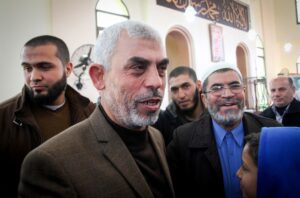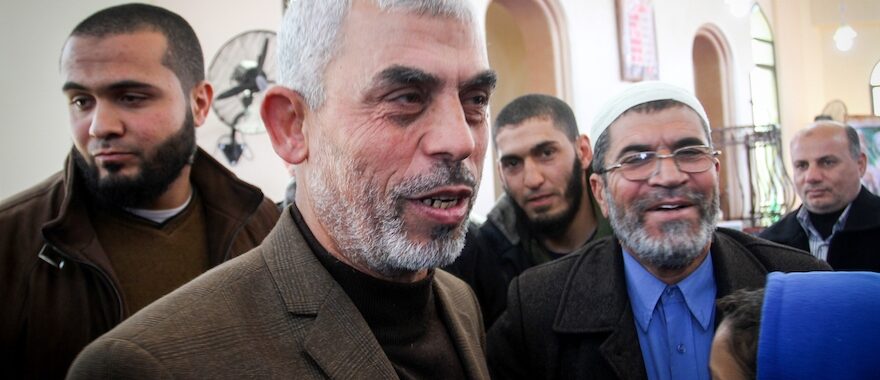By Ron Kampeas

Yahya Sinwar at the opening of a new mosque in Rafah, in the southern Gaza Strip, Feb. 24, 2017. (Abed Rahim Khatib/ Flash90)
(JTA) — Yahya Sinwar, the architect of the deadliest attack on Israel in its history, was killed in a firefight with Israeli forces.
“Yahya Sinwar planned and executed the October 7th Massacre, promoted his murderous ideology both before and during the war, and was responsible for the murder and abduction of many Israelis,” the Israeli army said Thursday in a statement. “Yahya Sinwar was eliminated after hiding for the past year behind the civilian population of Gaza, both above and below ground in Hamas tunnels in the Gaza Strip.”
Israeli Prime Minister Benjamin Netanyahu, in an address in Hebrew to the nation, said the killing brought the war closer to its end, and once the remaining hostages were released he anticipated a pivot toward regional peace.
“The return of the hostages is an opportunity to achieve all our aims and bring closer the end of the war,” Netanyahu said.
“To the peoples of the region I say, in Gaza, Beirut, throughout the region, darkness is receding and light is rising,” he said. “I call on you, the peoples of the region, we have a great opportunity to stop the axis of evil and create a different future, a period of growth in the whole region. Together, we can expel the curse and to advance the blessing.” The “axis of evil” refers to Iran and its allies, including Hamas, which was led by Sinwar, and Hezbollah in Lebanon.
Sinwar’s death comes just over two months after he ascended to Hamas’ top position, following the assassination attributed to Israel of the terror group’s political leader Ismail Haniyeh in Tehran in July.
Both before and since, U.S. officials viewed Sinwar as the principal obstacle to a ceasefire that would include the release of hostages.
“This is a good day for Israel, for the United States, and for the world,” President Joe Biden said in a statement.
Sinwar’s killing could accelerate the hostages’ release and an end to the war in Gaza even as fighting has intensified in Lebanon and the threat of an Iran war still looms. A major success for Israel could also tamp down tensions between the Netanyahu and Biden governments.
“There is now the opportunity for a ‘day after’ in Gaza without Hamas in power, and for a political settlement that provides a better future for Israelis and Palestinians alike,” Biden said. ” Yahya Sinwar was an insurmountable obstacle to achieving all of those goals. That obstacle no longer exists. But much work remains before us.”
Even before the army confirmed Sinwar’s death, there were official hints that he had been killed. Yoav Gallant, the Israeli defense minister, posted on X a trio of portraits: A blank one with a red X, flanked by photos of Hezbollah chief Hassan Nasrallah and Mohammed Deif, Sinwar’s deputy, with red Xs over their faces. Israel in recent months assassinated Deif and Nasrallah.
“‘You will pursue your enemies and they will fall before you by the sword.’ — Leviticus 26. Our enemies cannot hide,” Gallant tweeted. “We will pursue and eliminate them.”
The army released a photo of the heads of the army and the Shin Bet, the internal security service, consulting with each other in an aircraft, with no further explanation. Such photos have previously hinted at a major operation.
Sinwar plotted the Hamas invasion on Oct. 7, 2023, in which about 1,200 people in Israel were massacred and another 250 abducted. The attack launched a war that has roiled the Middle East and Israel’s relations with the United States and much of the world. It has also resulted in the deaths of more than 40,000 Palestinians in Gaza, of whom a substantial portion have been civilians, and the displacement of almost all of the strip’s 2 million residents.
Documents recovered by the Israeli army and delivered in recent days to major Western news outlets revealed that Sinwar hoped to draw Iran and Hezbollah into the war, and for Israel’s demise within the next few years. Both entities intensified their engagement with Israel but resisted full involvement until recent weeks. Sinwar reportedly still hoped for the conflagration to metastasize and resisted deals for a ceasefire that would effectively require Hamas’ surrender.
Hezbollah, a Lebanon-based terrorist group, intensified its rocket attacks on Israel on Oct. 8, 2023, leading to the evacuation of tens of thousands of Israeli and Lebanese civilians on both sides of the border. But the conflict in the north did not intensify until the summer. Israel assassinated Nasrallah and much of the Hezbollah leadership last month and continues to battle in Lebanon.
Jonathan Schanzer, vice president of the Foundation for the Defense of Democracies, said Sinwar’s killing was a game changer that could accelerate the release of some 100 hostages still held in Gaza. He noted that much of Hamas’ leadership has been eliminated, with just Khaled Meshaal, the only name with international resonance, left alive in Qatar.
“If he’s gone it leaves a huge vacuum,” he said about Sinwar. “There is considerable leverage for the U.S. to force the release of hostages, to force surrender, to force the extradition of Meshaal to Israel, the U.S. or a third country.”
Sinwar and his two companions were killed in a shootout Wednesday with conscripted soldiers from a non-elite unit who did not know whom they were confronting, Israeli media reported. Despite recent reports that Sinwar was using hostages as a human shield, hostages were not found in the vicinity. Yedioth Ahronoth reported that Netanyahu had informed the families that no hostages were known to be affected by the killing.
The Hostages and Missing Families Forum, a leading group advocating for the families, applauded Sinwar’s likely death in a social media post and said it should be seen as a path to securing the release of the remaining hostages, of whom about one third are known to be dead.
“While acknowledging the significant achievement, the families of the hostages express grave concern for the fate of 101 men, women and children, still held captive by Hamas, and urge leveraging this major achievement into an immediate deal to secure hostages’ return,” the group said. “We call on the Israeli government, world leaders, and mediating countries to leverage the military achievement into a diplomatic one by pursuing an immediate agreement for the release of all 101 hostages: the living for rehabilitation and the murdered for proper burial.”
Defense Minister Yoav Gallant called for Hamas to surrender and for the release of hostages, some of whom are believed to be held in the homes of families.
“Sinwar died while beaten, persecuted and on the run – he didn’t die as a commander, but as someone who only cared for himself,” Gallant said in remarks his office distributed on video, showing Gallant in a protective vest standing in front of tanks. “This is a clear message to all of our enemies – the IDF will reach anyone who attempts to harm the citizens of Israel or our security forces, and we will bring you to justice.”
Netanyahu called on people in Gaza holding hostages to release them, pledging Israel would drop any efforts to capture them if they did so. “I say to all who are holding our hostages, whoever lays down his arms and returns our hostages we will set him free and to live,” he said. “And by the same token I say to those who harm our hostages, his blood is on his hands, we will close accounts with him.”
Gershon Baskin, an Israeli who in 2011 helped negotiate the exchange of Sinwar among more than a thousand Palestinian prisoners for Israeli soldier Gilad Shalit, told Kan, Israel’s government run broadcaster, that any hostage deal would take at least a few days. Hamas officials, with whom Baskin still is in touch — although he said he was not able to reach any on Thursday — have previously told him that it would take at least three or four days of a total ceasefire to track down the hostages held in various places around the Gaza Strip.
Israel’s war in Gaza has led to international opprobrium, which Israel says is underserved, including investigations launched against Israel and its top officials in international courts. The war, and Netanyahu’s resistance to ending it, has also strained relations between the Israeli and American governments.
Schanzer said the killing would substantively shift U.S.-Israel relations. He noted that earlier this week the Biden administration had warned Israel that it needed to accelerate the entry into Gaza of humanitarian assistance or face the possibility of restrictions on weapons transfers in 30 days.
“Yesterday we were watching a spat evolve between the White House and Israel about Israel’s freedom of action in Gaza over the next 30 days,” he said. “That may be a moot point right now, because we already know that 23 out of 24 Hamas brigades have been destroyed. The top commanders are no longer alive. The infrastructure above ground has been destroyed. The underground infrastructure has been mapped almost entirely, and somewhere between 10 and 15% of that has been destroyed.”
He predicted low-level counterinsurgency operations for now and stasis in the broader war until after the U.S. presidential elections next month, when regional powers may have a better idea of how to go forward in ending the war and rebuilding the Gaza Strip and Lebanon.
Netanyahu in his address alluded to one of his many arguments with the Biden administration, over how and whether to enter Rafah, and whether to arrive at a ceasefire. “It is now clear to everyone in Israel and throughout the world why we insisted on not ending the war, why we insisted despite all pressures to enter Rafah, the secure fortress of Hamas where Sinwar and most of the murderers were hiding out.”
Photos of a man resembling Sinwar with part of his head blown off circulated on social media and the army had earlier said that it was seeking to confirm whether a slain man resembling Sinwar was indeed the terrorist leader.
Kan earlier quoted senior official sources as saying that DNA testing confirmed that the Hamas chief was one of three terrorists killed in a shootout Thursday with Israeli forces in Rafah, the city on the Gaza-Egypt border.
Kan also reported that Israeli police had confirmed the killing through dental records held from the period Sinwar spent in an Israeli prison.



